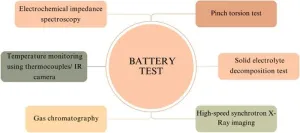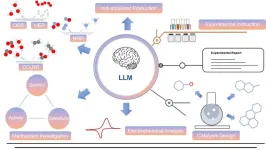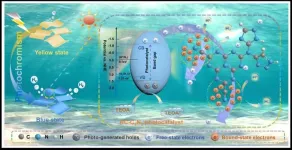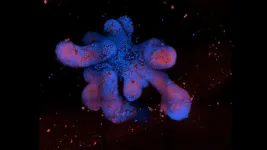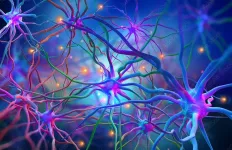(Press-News.org) Spatial navigation – the ability to select and follow a route from one place to another – is a skill we use every day. Depending on practice, general cognitive ability, and childhood environment, some people are naturally better at this than others. But research has also shown that people’s skill in spatial navigation tends to decrease with increasing age.
This decline in navigation skill has been generally attributed to worsening spatial memory, due to changes in brain structure and function that naturally occur with age. But what if it isn’t just due to our spatial memory declining, but also to changes in how we explore a novel environment? Such a shift has been observed in aging animals, ranging from insects to rodents and fish.
And now, an analogous shift in exploration behavior in middle age has been shown for the first time in humans. These results, which ultimately could have clinical applications, are published in Frontiers in Aging Neuroscience.
An exploratory study
First author Dr Vaisakh Puthusseryppady, a postdoctoral researcher at the University of California at Irvine, said: “Compared to younger individuals, middle-aged people exhibit overall less exploration when learning a novel maze environment, and seem to be prioritizing learning specific important locations in the maze as opposed to the overall maze layout.”
Puthusseryppady and colleagues recruited 87 middle-aged (on average 50 years old) and 50 young (on average 19 years old) women and men as volunteers. None had a history of neurologic disease including dementia, or psychiatric illness.
A-mazing landmark research
The researchers tested how well the volunteers explored and learned to navigate a maze in virtual reality. The maze was composed of crossroads and corridors, separated by hedges. Distinctive objects were scattered around it at strategic locations as landmarks. In the first ‘exploration phase’, the volunteers were instructed to freely explore the maze and learn the locations of the objects.
In each of the 24 trials in the second ‘wayfinding phase’, the volunteers had to apply what they had learnt, navigating between two randomly chosen objects within 45 seconds.
As expected, young people on average had a greater success rate in finding their way. But importantly, further statistical analyses showed that this difference in success rate was partially driven by observed qualitative changes in how young vs middle-aged participants learned about the maze.
"Compared to younger individuals, middle-aged individuals explored the maze environment less, as they traveled less distance, paused for longer periods of time at decision points, and visited more objects than young individuals,” said Dr Mary Hegarty, a professor at the Department of Psychological and Brain Sciences of the University of California at Santa Barbara, and a joint corresponding author.
These differences were so notable, the authors were able to predict using artificial intelligence whether a participant was middle-aged or young.
Pointing the way for applications
Reduced exploration in middle-aged people may be due to age-related changes in the brain’s navigation network, for example the medial temporal and parietal lobes.
The authors speculated that these findings could inform training interventions that can help middle-aged adults to improve their navigation abilities and preserve cognitive ability.
Co-author Daniela Cossio, a PhD student at the University of California at Irvine, explained: “If we were to train middle-aged people to explore novel environments better – with a focus on traveling greater distances, visiting paths that connect the environment, in a more spread-out manner – this might lead to improvements in their spatial memory, helping to slow down their decline in cognitive ability."
Dr Elizabeth Chrastil, one of the corresponding authors, and an associate professor at the same institute, looked ahead: “We are currently investigating whether these kinds of changes in exploration behavior can be identified in people at risk of Alzheimer's Disease, as well as in those who actually have Alzheimer's. We anticipate that altered exploration behavior could ultimately become a novel clinical marker for early cognitive decline related to Alzheimer’s".
END
How older people explore new spaces could suggest cognitive decline and dementia
Helping middle-aged people to find their way more efficiently could delay cognitive decline: this is why
2024-06-11
ELSE PRESS RELEASES FROM THIS DATE:
How should Japan make use of vacant homes in old new towns?
2024-06-11
During Japan’s 1960-90 population boom, new towns sprouted up across the nation. These new towns were quiet residential neighborhoods of suburban areas, many of which are now shrinking in terms of inhabitants. They have become old new towns, aging neighborhoods amid Japan’s population decline, frequently dotted with vacant homes.
Dr. Haruka Kato, a junior associate professor at the Graduate School of Human Life and Ecology at Osaka Metropolitan University, examined the nonlinear relationship between population decline and the urban transformation of residences to other land-use plots in old new towns. His research group wanted ...
Sustainable battery technology: innovations in design, manufacturing, and fault detection
2024-06-11
In an era where sustainable energy is paramount, a groundbreaking study provides critical insights into battery health management. It meticulously examines the design, optimization, fault detection, and recycling of Lithium-ion, Lead Acid, and Nickel Metal Hydride (NiMH) batteries—crucial components for the next generation of portable devices, electric vehicles, and renewable energy systems.
As our reliance on electric vehicles and renewable energy systems grows, so does the demand for efficient and sustainable ...
Large language model in electrocatalysis
2024-06-11
Large language models, outstanding representatives of modern technology, have significant impacts on various fields of modern society. These models, constructed by billions of neurons, incorporate the extensive knowledge accumulated by humans so far, possessing the exceptional abilities to chat with people around the world fluently. Their human-like intelligence enables them to tackle various challenges of modern society and shows great potential for applications in various fields.
Recently, a research team led by Prof. Ziyun Wang from the University of Auckland in New Zealand delved into the potential applications of large language models in the field ...
Bound-state electrons synergy over photochromic high-crystalline C₃N₅ nanosheets in enhancing charge separation for photocatalytic H₂ production
2024-06-11
Photocatalytic water splitting, a sustainable energy strategy, utilizes solar energy to produce clean hydrogen fuel. While it offers a promising solution to the global energy crisis and environmental pollution, the slow kinetics of photogenerated electron-hole pairs result in low activity for most semiconductor materials, even with sacrificial agents. To that end, integrating electron traps and reactive centers could be a feasible strategy to enhance charge separation and catalytic performance.
In ...
Engagement key to eliminating prejudice: Uncovering the process of feeling understood
2024-06-11
Osaka, Japan - A research group at Osaka University has uncovered how the view of other people and groups changes when individuals feel that they are understood by others by conducting an experimental study on the relationship between Japanese and Chinese people. The study shows that the role of felt understanding largely derives from a reduction in prejudice toward the other person.
Feeling understood by other people is a crucial determinant for positive interpersonal and intergroup relationships; however, the psychology behind this determinant was not well understood.
In ...
1 in 7 adults have experienced someone threaten to share their intimate images: new research
2024-06-11
A global study on the prevalence of sexual extortion among adults has found the issue to be more widespread than initially thought.
Sexual extortion, or sextortion, is a form of image-based sexual abuse which includes making threats to share intimate photos or videos of a victim unless they comply with the perpetrator’s behavioral or financial demands.
The research, led by RMIT University in partnership with Google, surveyed over 16,000 adults across Australia, North and Central America, Europe and Asia and found 14.5% of respondents reported being victims of sextortion, while 4.8% admitted to being perpetrators.
LGBTQ+ ...
Treating rare skin diseases by transplanting healthy skin
2024-06-11
Researchers from Nagoya University Graduate School of Medicine in Japan have successfully treated the skin diseases epidermolytic ichthyosis (EI) and ichthyosis with confetti (IWC) by transplanting genetically healthy skin to inflamed areas. Transplanting healthy skin to inflamed areas has been used as a treatment option for severe burn injuries. They applied this technique from a common disease to rare diseases. Their research could pave the way for a new and effective treatment strategy for these challenging skin disorders. The study was published in the British Journal of Dermatology.
EI and IWC are rare genetic skin disorders caused by mutations in one of the two genes ...
Revealed: tricks used by opioid giant to mold doctors’ minds
2024-06-11
Opioid giant Mallinckrodt, selling more than Purdue Pharma in the US, was forced by the courts to publish more than 1.3 million internal documents.
In The BMJ today, researchers Sergio Sismondo and Maud Bernisson sift through nearly 900 contracts which together reveal a carefully coordinated effort to shape medical attitudes toward pain medicine.
Pharmaceutical companies have a long history of managing physician and public opinion, explain the authors. For example, by recruiting physicians to serve as influencers, planting articles in scientific journals, coordinating conference presentations, and developing continuing medical education (CME) courses.
Amid surging ...
Lab-grown ‘mini-guts’ could help in development of new and more personalized treatments for Crohn’s disease
2024-06-11
Cambridge scientists have grown ‘mini-guts’ in the lab to help understand Crohn’s disease, showing that ‘switches’ that modify DNA in gut cells play an important role in the disease and how it presents in patients.
The researchers say these mini-guts could in future be used to identify the best treatment for an individual patient, allowing for more precise and personalised treatments.
Crohn’s disease is a form of inflammatory bowel disease (IBD). It is a life-long condition characterised by inflammation of the digestive tract that affects around one in 350 people in the UK, with one in four presenting before the age of 18. Even at its mildest, it ...
How the brain is affected by Huntington’s Disease
2024-06-11
The genetic disease Huntington’s not only affects nerve cells in the brain but also has widespread effects on microscopic blood vessels according to research.
These changes to the vasculature were also observed in the pre-symptomatic stages of the disease, demonstrating the potential for this research for predicting brain health and evaluating the beneficial effects of lifestyle changes or treatments.
Huntington’s disease is an inherited genetic condition leading to dementia, with a progressive decline in a person’s movement, memory, and cognition. There is currently no ...
LAST 30 PRESS RELEASES:
High-risk pregnancy specialists present research on AI models that could predict pregnancy complications
Academic pressure linked to increased risk of depression risk in teens
Beyond the Fitbit: Why your next health tracker might be a button on your shirt
UCSB scientists bottle the sun with liquid battery
Lung cancer drug offers a surprising new treatment against ovarian cancer
When consent meets reality: How young men navigate intimacy
Siemens Healthineers and Mayo Clinic expand strategic collaboration to enhance patient care through advanced technology
Physicists develop new protocol for building photonic graph states
OHSU-led research initiative examines supervised psilocybin
New review identifies pathways for managing PFAS waste in semiconductor manufacturing
New research finds state-level abortion restrictions associated with increased maternal deaths
New study assesses potential dust control options for Great Salt Lake
Science policy education should start on campus
Look again! Those wrinkly rocks may actually be a fossilized microbial community
Exposure to intense wildfire smoke during pregnancy may be linked to increased likelihood of autism
Children with Crohn’s have distinct gut bacteria from kids with other digestive disorders
Genomics offers a faster path to restoring the American chestnut
Caught in the act: Astronomers watch a vanishing star turn into a black hole
Why elephant trunk whiskers are so good at sensing touch
A disappearing star quietly formed a black hole in the Andromeda Galaxy
Yangtze River fishing ban halts 70 years of freshwater biodiversity decline
Genomic-informed breeding approaches could accelerate American chestnut restoration
How plants control fleshy and woody tissue growth
Scientists capture the clearest view yet of a star collapsing into a black hole
New insights into a hidden process that protects cells from harmful mutations
Yangtze River fishing ban halts seven decades of biodiversity decline
Researchers visualize the dynamics of myelin swellings
Cheops discovers late bloomer from another era
Climate policy support is linked to emotions - study
New method could reveal hidden supermassive black hole binaries
[Press-News.org] How older people explore new spaces could suggest cognitive decline and dementiaHelping middle-aged people to find their way more efficiently could delay cognitive decline: this is why

